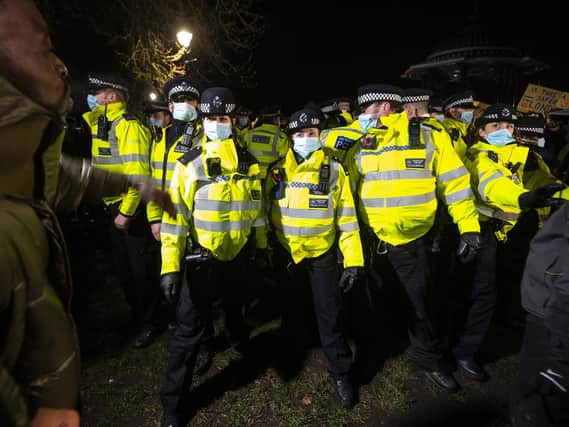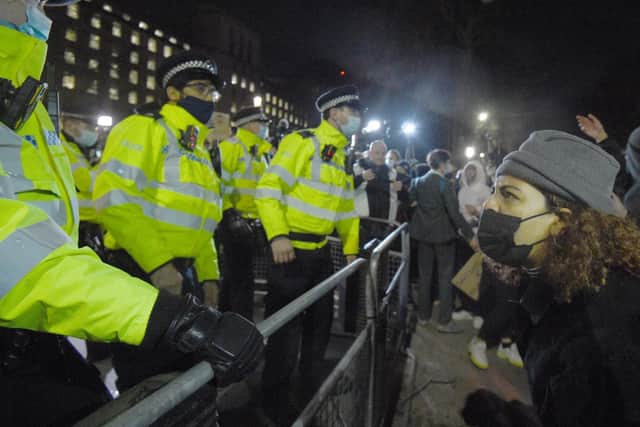'Fundamental rights' breached by police at vigil for York woman Sarah Everard and Kill The Bill protests


There were “multiple failings” by the Metropolitan Police and Avon and Somerset Police in the way they handled events at Clapham Common, south-west London, and in Bristol in March, according to the All Party Parliamentary Group on Democracy and the Constitution (APPGDC).
The group of MPs and peers has proposed amendments to the Police, Crime, Sentencing and Courts Bill (PCSC), which is due to be debated on Monday, as a result of the findings.
Advertisement
Hide AdAdvertisement
Hide AdInquiry chairman, the Labour MP Geraint Davies, said the right to peaceful protest “must be supported not suppressed by the law”, adding: “The police must not become the enforcement agency of the state against those who choose to publicly and collectively call for change – political, economic, social or environmental.


“Parliament must protect our freedoms and reject attempts to increase police power and restrict our right to peaceful protest. The police should help to facilitate the expression of peaceful protest and not drive opposition underground.”
The report comes after student Patsy Stevenson, who was arrested at the vigil, said she is preparing to start legal action against the Met if it does not withdraw a fine she was issued.
Scotland Yard faced a barrage of criticism, including calls for Commissioner Dame Cressida Dick to resign, after protesters were bundled to the ground and arrested after gathering in memory of 33-year-old Ms Everard, who was killed after disappearing while walking home.
Advertisement
Hide AdAdvertisement
Hide AdAn official report from police watchdog Her Majesty’s Inspectorate of Constabulary and Fire and Rescue Services (HMICFRS) backed the Met’s handling of the event and found no evidence of heavy-handedness.
But it hit out at the force’s “tone deaf” response to criticism of the way it dealt with protesters, saying it should have taken a more conciliatory approach.
The Kill the Bill protest in Bristol – against Government plans to give police sweeping powers to control demonstrations – started peacefully but hours later turned into a riot when around 500 people marched on Bridewell police station, set fire to police vehicles and attacked the building. Later protests also ended with clashes between activists and officers.
Both police forces wrongly applied lockdown laws and their “failure to give transparency and clarity about how they would enforce the regulations in respect of peaceful protest also breached fundamental rights”, according to the parliamentary group’s findings.
Advertisement
Hide AdAdvertisement
Hide AdThe forces “failed to understand their legal duties in respect of protest” and “failed to conduct a proper assessment of the proportionality of their actions”.
The inquiry also found:
– The Met “increased the risk to both officers and civilians” by failing to work with the proposed organisers of the vigil, to facilitate a planned and safe event – which “created the conditions for their later enforcement intervention”. Covid-19 risks were not considered and taking action “may have increased the risk of Covid-19 transmission at the vigil.”
– Avon and Somerset officers “faced real violence but failed to distinguish between those protesting peacefully and those engaged in acts of violence” and used “excessive force against peaceful protestors”.
HMICFRS inspectors were also criticised for appearing not to take into account testimony from people at the vigil in its review – something described as a “significant failing” by the parliamentary group which said made it “impossible” to give the watchdog’s findings “full weight.”
Advertisement
Hide AdAdvertisement
Hide AdBut the report acknowledged police were put in “difficult situations” due to the “ambiguity” of coronavirus rules.
Scrapping new proposed powers to limit the right to peaceful demonstrations has been suggested as an amendment to the Bill, alongside a code for policing protests.
The findings deemed new proposed powers “unnecessary” and found they placed police in an “unfair position” as officers will “be able to decide if protests go ahead and under what conditions”, eroding the “legitimacy of the police as a non-political service”.
The code would place a “duty” on police to facilitate peaceful protest and allow people to bring legal action against forces if breached, the report added.